

Marine biologist job profile. A career in marine biology would suit you if you're passionate about the environment, want to make a difference to future generations and are driven to stand out in a competitive field Marine biology is the study of all aspects of life in the sea and the environment on which it depends.
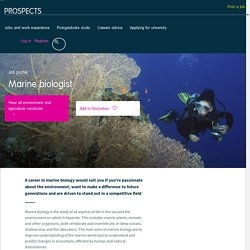
This includes marine plants, animals and other organisms, both vertebrate and invertebrate, in deep oceans, shallow seas and the laboratory. Nanotechnologist job profile. Nanotechnologists push the boundaries of interdisciplinary science to create new materials, methods or procedures based on nano-scale particles and interactions Nanotechnologists manipulate matter on the nanoscale (one billionth of a metre), developing new materials and equipment as well as drugs and diagnostic tools.
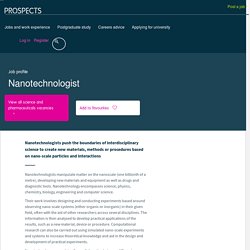
Nanotechnology encompasses science, physics, chemistry, biology, engineering and computer science. Their work involves designing and conducting experiments based around observing nano-scale systems (either organic or inorganic) in their given field, often with the aid of other researchers across several disciplines. The information is then analysed to develop practical applications of the results, such as a new material, device or procedure. Research scientist: job description. Research scientists are responsible for designing, undertaking and analysing information from controlled laboratory-based investigations, experiments and trials.
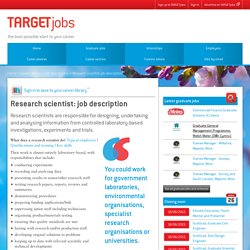
What does a research scientist do? Typical employers | Qualifications and training | Key skills Their work is almost entirely laboratory-based, with responsibilities that include: Research scientist Job Information. Page Content Research scientist HoursVariableStarting salary£23,000 + per year As a research scientist, you would plan and carry out experiments and investigations to broaden scientific knowledge in a range of areas, from life sciences to industrial processes.

If you have an enquiring mind, and would like to be at the forefront of scientific discovery, this could be the career for you. You’ll need to be good at solving problems, and collecting and interpreting data. To get into this job you would need a degree and usually a postgraduate qualification, such as a PhD. Research scientist (life sciences): Job description. Research within life sciences covers a whole range of scientific disciplines including: neurosciences; plant sciences; physiology; pharmacology; cancer studies; microbiology; genomics; bioinformatics; biotechnology; stem cell research.

The work is close to the medical sciences but also crosses over into other areas such as biochemistry. Researchers within this field are primarily involved in planning and conducting experiments and analysing results, either with a definite end use (to develop new products, processes or commercial applications), or to broaden scientific understanding in general. As a researcher, you will usually carry out your experiments and research on your own, but you will typically be part of a larger team and will share your findings and relevant information with professional colleagues. This is sometimes done at international conferences or through the publication of research papers. Zoologist job information. Page Content Zoologist Hours30-40 per weekStarting salary£21,000 + per year.

Research scientist (maths): Job description. Research mathematicians work in a wide range of areas.

Common employers include private or government research laboratories, commercial manufacturing companies and universities. The work is varied but often involves proving deep and abstract theorems, developing mathematical descriptions (mathematical models) to explain or predict real phenomena and applying mathematical principles to identify trends in data sets. Applied research can also contribute to the development of a commercial product or develop intelligence about business trends. Colour technologist: Job description. A colour technologist is involved with the science and technology of colour application and its subsequent performance.

Colour technologists work in various sectors of the manufacturing industry and produce dyes and pigments for a whole range of products including: textiles; paper; cosmetics; foodstuffs; medical products; toiletries; furnishings. They develop high technology dyes for applications in dye lasers, liquid crystal displays, fraud prevention techniques and ink-jet printers. Colour technologists work on the development, application, measurement and perception of colour.
They may take on an analytical role, making sure reproduction is accurate, application is even and the colour has durability. Colour technologists can also be known as a dyeing technologist or colour scientist. Colour technologist: job description. Colour technologists are responsible for developing and producing dyes and pigments.
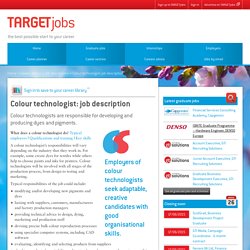
What does a colour technologist do? Typical employers | Qualifications and training | Key skills A colour technologist’s responsibilities will vary depending on the industry that they work in. Zoologist job profile. If you are scientific, practical and passionate about animals, then a career as a zoologist may be for you Zoologists study the evolution, anatomy, physiology, behaviour, distribution and classification of animals.
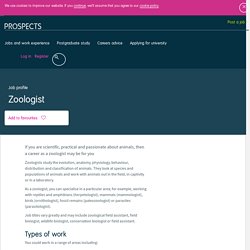
They look at species and populations of animals and work with animals out in the field, in captivity or in a laboratory. As a zoologist, you can specialise in a particular area; for example, working with reptiles and amphibians (herpetologist), mammals (mammologist), birds (ornithologist), fossil remains (paleozoologist) or parasites (parasitologist). Job titles vary greatly and may include zoological field assistant, field biologist, wildlife biologist, conservation biologist or field assistant.
ScienceResearchDevelopment Scientificresearchanddev. V1 TIPS FOR STARTING A RESEARCH CAREER. Where Science meets Business: Research & Development in the consumer goods industry. This is a guest post written by Oliver Moore on behalf of RB Careers. The post focuses on scientific research and development in the consumer healthcare and fast-moving consumer goods industry. Although not the focus of the post, much of what is covered could equally apply to more technical or engineering related research and development roles in this sector.
What is Research & Development and how does it relate to the consumer healthcare/ FMCG industry? University of Leeds Careers Centre Blog. Are you considering an academic career? It can be difficult to know where to start, so in this blog post our Careers Consultant, Becky Clark, gives her top tips on how to be successful in academia. Whether you are at undergraduate, Masters or doctoral (see definition below)* level you may be considering an academic career. If you are passionate about your subject, like, and are good at, research, love being within a university and want to share your knowledge with university students then an academic career may be for you. Some academics focus primarily on teaching, some focus solely on research. Many roles combine both. Getting into….the 3D printing industry. In this guest post Dee Fisher, MD of 3DPrintedJobs, gives an overview of this growing industry, key job roles within it and tips for success.
The 3D printing industry is growing rapidly and with it the demand for 3D printing jobs. This article will give you an understanding of what 3d printing is, what jobs are available, what these roles involve and some useful interview tips. What Is 3D Printing? 2008_ABPI_Skills_Report.pdf. How to get published in an academic journal: top tips from editors. Writing for academic journals is highly competitive. Even if you overcome the first hurdle and generate a valuable idea or piece of research - how do you then sum it up in a way that will capture the interest of reviewers?
There’s no simple formula for getting published - editors’ expectations can vary both between and within subject areas. But there are some challenges that will confront all academic writers regardless of their discipline. How should you respond to reviewer feedback? Female science writers celebrated. A Royal Society discussion has considered the behind-the-scenes and often neglected roles that women have long played in the advancement of science. Held on 10 March to tie in with International Women’s Day, “Women Writing Science” brought together three historians to explore and celebrate the major contributions made by women even at a time when the doors to universities, learned societies and laboratories were largely closed to them.
Patricia Fara, senior tutor in the philosophy of science at the University of Cambridge, considered their crucial place in communicating and translating science. Michael Faraday was “an example of a major scientist brought into science by a woman”, since he always stressed the life-changing impact on him of Jane Marcet’s 1805 book, Conversations on Chemistry, Intended More Especially for the Female Sex. Career Planning for PhDs ebook. How to Apply for an Academic Job ebook. Animal Replacement Science. AIRTO - making innovation happen. Nanotechnology News, Articles, Directory and more. Technology. Beilstein Journal of Nanotechnology - Home. Careers in Healthcare Business Intelligence. Welcome to the Careers section of the BHBIA Website. British Antarctic Survey - Homepages.
Clinical & Contract Research Association. CPI Home Page. Vol 84, Pgs 1-208, (July, 2014) CTE Resource Center - Featured Resources - Nanotechnology. DHT Homepage - Dr Hadwen Trust. Engage - The interactive research resource for bioscience undergraduates. Nanotechnology - Foresight Institute. Welcome to INCPEN The Industry Council for Packaging and The Environment.
Institute of Biomedical Science: home for biomedical scientists. Homepage. LondonLifeScience.com. Regulatory and Quality Compliance Solutions to the Medical Device Industry - Maetrics Limited. Materials World. Welcome to MPMA - Metal Packaging Manufacturers Association. Home - MyRSC. Welcome to Nano Magazine. Nanotechnology. Nanoscale Science & Technology. Nanotechnology journal. Bioentrepreneur. Home : Nature Materials. Home : Nature Methods. Home : Nature Nanotechnology. Science news and science jobs from New Scientist - New Scientist.
Welcome to The Packaging Society. The Packaging Society, formerly the Institute of Packaging, is here to support you throughout your career in packaging and is one of the world's oldest and foremost professional bodies for packaging professionals. Whether you work in Packaging Design, Packaging Technology, Packaging Development, Compliance or Branding The Packaging Society is for you. Click here to see what packaging members say about the benefits of the Accredited Packaging Professional Award As the premier training provider in a variety of packaging technology areas in the UK, the Packaging Society can support you from the outset of your career, gaining knowledge and credibility, and then further your career with knowledge updating and technical specialisms.
Importantly The Packaging Society links you to the wider community of packaging professionals giving you access to their collective knowledge and contacts as well as building your profession network. News SPE’s ANTEC® 2014 – Only Two Weeks To Go. Find a Nanotechnology Postgraduate Degree (51 courses) V1 Innovationbookletfinalweb. Welcome. Promoting ethical science, design and technology. Untitled Document. Sustainable Nanotechnology Organization.
TryNano.org : Welcome to TryNano.org. UK Clinical Research Collaboration. UKSPA. UK Steel home : UK steel : EEF. Jump to secondary navigation Hello. Sign in for UK Steel Members' Area. Jump to main navigation UK Steel - the trade association for the UK Steel industry. Find out more about our industry Membership We are the trade association for the UK steel industry. Join us now More about membership About our industry Steel is vital to the manufacturing - and the UK economy. More about consultancy Representing the sector We work with government, industry and stakeholders to represent our sector.
Researcher professional development.